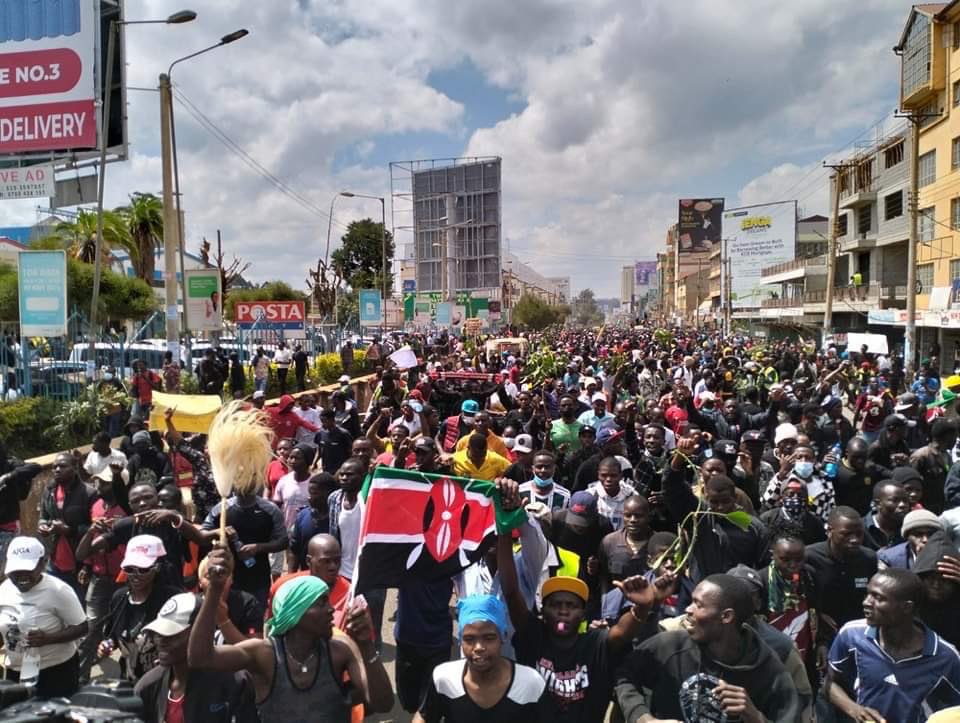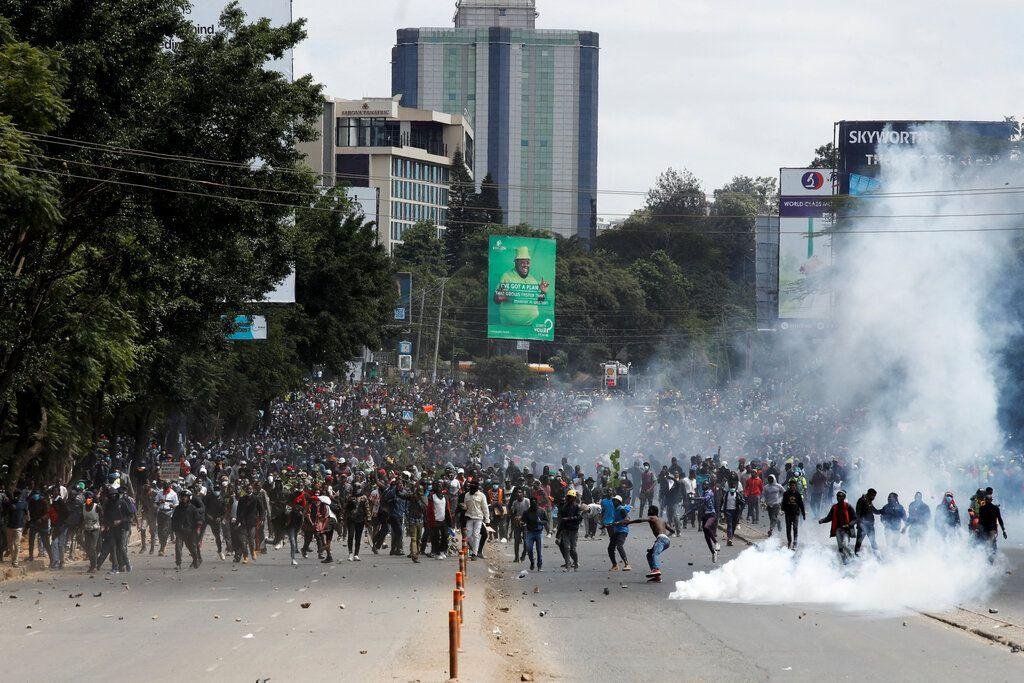
In recent weeks, Kenya has been gripped by a wave of protests that have brought to the fore deep-seated issues of governance, economic challenges, and public discontent. This blog post aims to provide a comprehensive analysis of the current situation, examining the causes of the protests, the government’s response, and potential paths forward for the nation.

The Spark of Unrest: Understanding the Protests
The Finance Bill and Public Outcry
At the heart of the recent unrest lies the controversial Finance Bill, which has become a lightning rod for public frustration. The bill, intended to address Kenya’s economic challenges, has instead become a symbol of what many Kenyans perceive as a disconnect between the government’s policies and the realities faced by ordinary citizens.
The protests that have erupted in response to this bill are not merely about financial legislation. They represent a broader expression of frustration with unfulfilled government promises, persistent economic hardships, and a perceived lack of accountability in governance. Many Kenyans, particularly the youth, feel that their voices are not being heard and that the government’s policies are exacerbating rather than alleviating their struggles.
The Red Line: Government’s Stern Warning
In a move that has further intensified the situation, the president has taken a hard line against the protesters. In a public address, he accused the demonstrators of crossing a “red line” and characterized their actions as an “act of treason” against Parliament. This strong language was accompanied by a threat to pursue not just the protesters themselves, but also those deemed to be the “planners, financiers, orchestrators, and abettors of violence and anarchy.”
This rhetoric from the highest office in the land has raised concerns about the government’s approach to handling dissent and its commitment to upholding democratic principles. The characterization of protest as treason has been viewed by many as an overreach and a potential threat to the constitutional right to peaceful assembly and expression.
Government Response: A Heavy Hand or Necessary Action?
The Crackdown: Force Meets Frustration
The government’s response to the protests has been swift and forceful. Security forces have been deployed in large numbers, and there have been reports of violent clashes between protesters and law enforcement. The use of tear gas, water cannons, and in some cases, live ammunition has been documented, leading to injuries and, tragically, loss of life.
This heavy-handed approach has been widely criticized both domestically and internationally. Human rights organizations have expressed concern about the disproportionate use of force and potential violations of citizens’ rights. Many observers argue that such a militarized response is not only ethically questionable but also strategically counterproductive, as it risks further inflaming tensions and alienating a population already feeling marginalized.
The Danger of Escalation
The president’s threat to treat the protests as treason and to pursue those involved at all levels marks a dangerous escalation in the government’s stance. This approach raises the specter of a broader crackdown that could extend beyond the streets and into various sectors of society, potentially targeting opposition leaders, civil society organizations, and even media outlets critical of the government’s actions.
Such an escalation carries significant risks. It could lead to a cycle of increased violence, further erode public trust in institutions, and damage Kenya’s international reputation as a stable democracy in East Africa. Moreover, it fails to address the root causes of the unrest, instead treating the symptoms while allowing underlying grievances to fester.
The Role of Institutions: Checks and Balances in Crisis
Parliament: Representation or Rubber Stamp?
In times of national crisis, the role of Parliament as the people’s representative body becomes crucial. However, the current situation has raised questions about the effectiveness of Parliament in fulfilling this role. Critics argue that Parliament has been too quick to align with executive decisions without providing the necessary scrutiny and debate that such significant legislation deserves.
The passage of the Finance Bill, which sparked the protests, has been particularly contentious. Many Kenyans feel that their concerns were not adequately represented or considered during the parliamentary process. This perception of Parliament as a rubber stamp for executive decisions rather than a forum for robust debate and representation of diverse viewpoints has contributed to the sense of disenfranchisement fueling the protests.
The Judiciary: Guardian of the Constitution
As tensions rise between the government and protesters, the role of the Judiciary becomes increasingly important. The courts are tasked with interpreting the law, protecting constitutional rights, and providing a check on executive power. In the current crisis, the Judiciary’s independence and willingness to uphold the rule of law, even in the face of political pressure, will be crucial.
Several legal challenges to the Finance Bill and the government’s handling of the protests are likely to come before the courts. How the Judiciary navigates these cases, balancing constitutional rights with public order concerns, will be a critical factor in shaping the trajectory of the crisis and maintaining public faith in Kenya’s democratic institutions.
Independent Commissions: Watchdogs in Turbulent Times
Kenya’s constitution established various independent commissions to provide oversight and promote good governance. Bodies such as the Kenya National Commission on Human Rights, the Independent Policing Oversight Authority, and the Ethics and Anti-Corruption Commission have important roles to play in the current situation.
These commissions are tasked with investigating allegations of human rights abuses, police misconduct, and corruption. Their ability to operate independently and effectively in the current charged political environment will be a test of Kenya’s institutional strength. The findings and recommendations of these bodies could play a crucial role in addressing grievances, promoting accountability, and helping to restore public trust.
The Constitution: A Beacon of Hope or a Paper Tiger?
The People’s Sovereign Power
Kenya’s 2010 Constitution is widely regarded as one of the most progressive in Africa. It enshrines the principle that sovereign power belongs to the people of Kenya and can be exercised directly or through democratically elected representatives. This constitutional provision is at the heart of the current debate about the legitimacy of the protests and the government’s response.
Protesters argue that they are exercising their sovereign right to hold the government accountable, while the government contends that sovereign power should be exercised through established institutional channels. This tension between direct popular action and representative democracy is a central theme in the ongoing crisis.
Constitutional Rights and Limitations
The Constitution guarantees a range of rights, including freedom of assembly, freedom of expression, and the right to petition the government. These rights form the legal basis for the protests. However, the Constitution also allows for limitations on these rights in the interest of public order and national security.
The current situation presents a complex balancing act between upholding constitutional rights and maintaining public order. How this balance is struck will have significant implications for Kenya’s democratic future. It raises fundamental questions about the extent to which rights can be limited in times of crisis and who gets to make those decisions.
Constitutional Remedies and Processes
Beyond rights and limitations, the Constitution provides various mechanisms for addressing grievances and effecting change. These include the recall process for elected officials, provisions for public participation in governance, and avenues for legal challenge of government actions.
As the crisis unfolds, there are growing calls for Kenyans to engage with these constitutional processes more actively. Advocates argue that sustainable change is more likely to come through consistent civic engagement and the utilization of constitutional mechanisms rather than through street protests alone.
The Way Forward: Dialogue, Reform, and Reconciliation
The Need for Inclusive Dialogue
As tensions continue to simmer, there is a growing consensus among moderate voices on all sides that dialogue is essential. A multi-stakeholder approach that brings together government officials, opposition leaders, civil society representatives, and community leaders could provide a forum for addressing grievances and finding common ground.
Such a dialogue process would need to be carefully structured to ensure that it is inclusive, transparent, and result-oriented. It would need to address not just the immediate triggers of the current crisis but also the deeper, long-standing issues that have contributed to public discontent.
Addressing Root Causes
While the Finance Bill may have been the immediate trigger for the protests, the underlying causes of discontent run much deeper. Economic inequality, youth unemployment, corruption, and a sense of political marginalization are all factors that need to be addressed for any lasting solution to be found.
A comprehensive reform agenda that tackles these systemic issues is necessary. This could include measures to stimulate economic growth and job creation, strengthen anti-corruption efforts, improve public service delivery, and enhance political inclusivity. Such reforms would require political will, resources, and time, but they are essential for long-term stability and progress.
Reconciliation and Trust-Building
The current crisis has deepened divisions within Kenyan society and eroded trust between the government and significant segments of the population. A concerted effort at reconciliation and trust-building will be necessary to heal these rifts.
This process could involve public acknowledgment of grievances, accountability for any excesses in the handling of protests, and concrete steps to demonstrate the government’s commitment to addressing public concerns. Civil society organizations, religious leaders, and community elders could play important roles in facilitating this reconciliation process.
Strengthening Democratic Institutions
The current crisis has highlighted both the strengths and weaknesses of Kenya’s democratic institutions. Moving forward, there needs to be a renewed focus on strengthening these institutions to make them more responsive, accountable, and effective.
This could involve measures to enhance the independence and capacity of oversight bodies, improve the functioning of Parliament, strengthen the electoral system, and promote civic education. A robust democracy requires not just strong laws but also a politically engaged citizenry and institutions capable of upholding democratic principles.
The Role of the International Community
Diplomatic Engagement and Support
As a key player in East African politics and economics, Kenya’s stability is of interest to the international community. Diplomatic engagement from regional bodies like the East African Community and the African Union, as well as from international partners, could play a constructive role in encouraging dialogue and de-escalation.
International support could also come in the form of technical assistance for institutional reforms, economic support to address some of the underlying economic challenges, and facilitation of dialogue processes.
Balancing Non-Interference and Constructive Engagement
While international engagement can be helpful, it’s crucial that it respects Kenya’s sovereignty and allows Kenyans to take the lead in resolving their political challenges. The international community’s role should be one of support and constructive engagement rather than interference or imposition of solutions.
Conclusion: A Crossroads for Kenyan Democracy
Kenya finds itself at a critical juncture. The ongoing protests and the government’s response to them have brought to the fore fundamental questions about the nature of democracy, the social contract between the government and its citizens, and the path to sustainable development and stability.
The choices made in the coming weeks and months will have far-reaching implications for Kenya’s future. Will the country emerge from this crisis with strengthened democratic institutions and a renewed social compact? Or will it see a retreat from democratic principles and a deepening of societal divisions?
The answers to these questions lie not just with the government or the protesters, but with all Kenyans. It will require wisdom, restraint, and a commitment to the greater good from all sectors of society to navigate this challenging period and emerge stronger on the other side.
As Kenya grapples with these challenges, it has the opportunity to set an example for the region and the continent. By finding a peaceful, inclusive, and democratic resolution to the current crisis, Kenya can reaffirm its position as a beacon of stability and progress in East Africa.
The path forward will not be easy, but with dialogue, reform, and a recommitment to constitutional principles, Kenya has the potential to transform this moment of crisis into an opportunity for renewal and progress. The eyes of the region and the world are watching, hoping to see Kenya’s democracy emerge stronger from this test.









